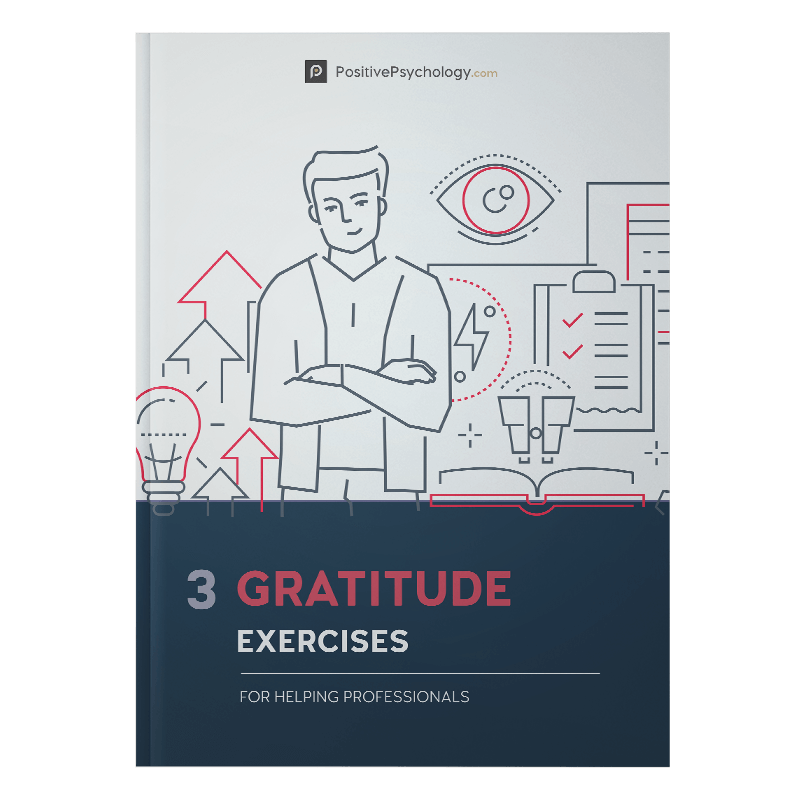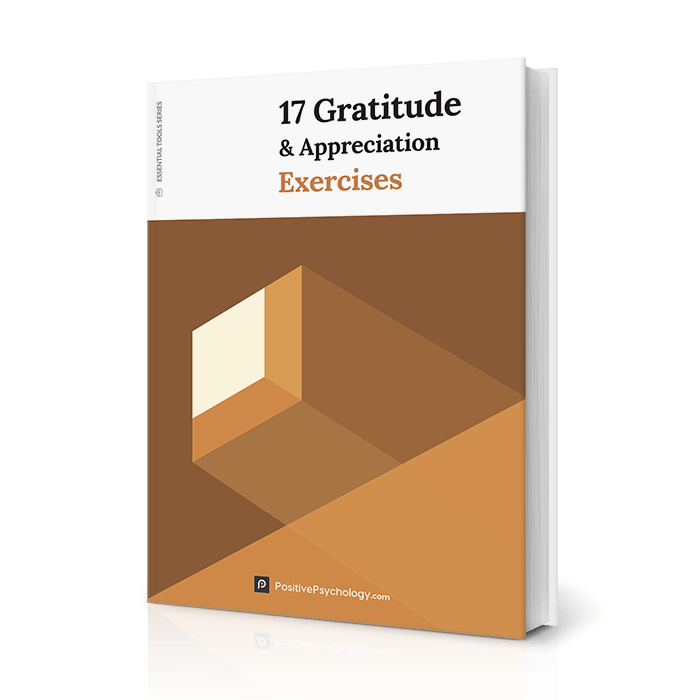 Gratitude meditation is a type of meditation which, as the name suggests, focuses on gratitude.
Gratitude meditation is a type of meditation which, as the name suggests, focuses on gratitude.
This article will define gratitude meditation, discuss some of its benefits, and relate it to mindfulness. It also includes a few guided gratitude meditations, so you can start your practice today.
Before you continue, we thought you might like to download our three Gratitude Exercises for free. These detailed, science-based exercises will help you or your clients connect to more positive emotions and enjoy the benefits of gratitude.
This Article Contains:
What is Gratitude Meditation?

“Buddhist monks begin each day with a chant of gratitude for the blessings of their life. Native American elders begin each ceremony with grateful prayers to mother earth and father sky, to the four directions, to the animal, plant, and mineral brothers and sisters who share our earth and support our life. In Tibet, the monks and nuns even offer prayers of gratitude for the suffering they have been given”
These examples show that gratitude meditation is neither new nor restricted to one spiritual or religious movement.
While some people might think of meditation along the lines of sitting in a dark room and clearing your mind, gratitude meditation can be practiced in many different settings. One might practice gratitude meditation while they wait for their morning coffee to brew, for example. According to Be Happy Yoga & Salt Cave, gratitude meditation is
“a simple way to meditate” because at its core, all you have to do is just “reflect on all the people and things you are grateful for.”
It is important to note that gratitude is not just about being thankful for the good things in your life, but it is about being thankful for everything in your life. There are things in your life which might initially seem bad, but upon further reflection actually, give you an opportunity to learn and grow. Part of gratitude is recognizing these blessings in all things. As Jack Kornfield says in the above link:
“open the meditation to include neutral people, difficult people, and even enemies- until you extend sympathetic joy to all beings everywhere, young and old, near and far”
Some gratitude meditation practices also include keeping a gratitude journal. This is simply a journal where you write down things you are grateful for, or even where you write letters to people you are grateful for. Gratitude journals are not a necessary part of a gratitude meditation practice, but they are an easy way to stay grateful throughout the day without losing sight of what is important.
What are the Benefits of Gratitude Meditation?

So what are the benefits of gratitude meditation? Well, there is a lot of overlap between the benefits of gratitude meditation and the benefits of general feelings of gratitude itself.
For example, one study (Rao & Kemper, 2016) found that gratitude meditation can reliably increase feelings of gratitude. This might seem like a silly or obvious finding, but it is important to verify that gratitude meditation leads to increased feelings of gratitude rather than just assume it does because it seems like a given.
This study is also interesting because participants were briefly trained in gratitude meditation online, practiced gratitude meditation just one time, and then immediately saw results. While many of us understand the importance of gratitude, that does not necessarily mean we practice feeling gratitude as often as we should.
This finding that practicing gratitude meditation just once can instantly increase our feelings of gratitude and lead us to all of gratitude’s benefits is an exciting one.
It also tells us that since gratitude meditation leads to higher levels of gratitude, any benefits that come with gratitude should also come from practicing gratitude meditation. Feelings of gratitude come with all sorts of benefits:
- Decreased levels of depression (Sirois & Wood, 2017)
- Higher levels of wellbeing (Nezlek, Newman, & Thrash, 2017)
- Trust in strangers (Drążkowski, Kaczmarek, & Kashdan, 2017)
- And even increased sleep quality (Jackowska, Brown, Ronaldson, & Steptoe, 2016)
On top of that, all of these benefits were found with relatively brief gratitude interventions, meaning that even practicing gratitude for a short amount of time can lead to higher levels of wellbeing.
Gratitude can also be a protective factor in certain situations. For example, gratitude has been shown to lead to positive outcomes following traumatic events such as campus shootings (Vieselmeyer, Holguin, & Mezulis, 2017) or destructive earthquakes (Lies, Mellor, & Hong, 2014), as well as following negative life experiences such as substance misuse (Chen, 2017).
In fact, one study looking at African-American adolescents (Ma, Kibler, & Sly, 2013) even found that gratitude was a protective factor that was associated with several different aspects of adolescence, such as higher levels of academic interest, engagement, and performance. That same study also found that higher levels of gratitude led to lower levels of drug use and early-adolescent sexual behavior.
Two other studies have shown that high levels of gratitude have even been associated with lower levels of suicidal ideation in some cases (Kleiman, Adams, Kashdan, & Riskind, 2013; Stockton, Tucker, Kleiman, & Wingate, 2016). This shows the importance of having high baseline levels of gratitude in general along with the potential value of gratitude interventions.
As for the benefits of gratitude meditation specifically, one study (O’Leary & Dockray, 2015) found that practicing gratitude meditation four times a week for three weeks (along with keeping a gratitude diary) led to reduced levels of stress and depression, as well as increased levels of happiness.
Anybody can incorporate this intervention into their lives with minimal cost and effort, making that finding extremely promising. This specific intervention’s schedule of four times a week for three weeks could also easily be incorporated in schools, prisons, and other situations.
These findings taken together indicate that starting a gratitude meditation practice yields near-immediate benefits that lead to increased levels of wellbeing. Having a gratitude meditation practice will also increase your levels of gratitude, which can serve as a protective factor in the face of certain traumatic events, as well as a protective factor against risky behaviors.
On top of that, the Rao and Kemper (2016) study shows that teaching people gratitude meditation can be done very quickly and that it can be done online. This means that just about anyone in the world can quickly learn about gratitude and gratitude meditation and start using it to their own benefit.
A Guided Gratitude Meditation Video (YouTube)
Now that you know what gratitude meditation is and some of the benefits it can lead to, you probably want to try it. Here are a few guided gratitude meditation videos to get your practice started.
One of these is a quick, short introduction to gratitude meditation, one is a bit longer, and one is only for people who are ready to commit to a long video.
You can find more TED Talks and videos on gratitude here.
Gratitude Meditation:
This is a slightly longer but still short (coming in at just over 10 minutes) guided video which will walk you through a gratitude meditation session. Even absolute beginners can enjoy this video, as the speaker will guide you through every aspect of the meditation.
Gratitude and Appreciation ~ A guided meditation:
Finally, this is a guided gratitude meditation which is just about half an hour long. It is a good choice for anyone looking for a long gratitude meditation session they can be guided through. While it is longer, it is still guided, so anybody who wants to try it is welcome, even beginners.
If you are familiar with mindfulness and mindfulness meditation, you might be noticing some similarities between mindfulness and gratitude at this point.
How Are Gratitude And Mindfulness Related?

One recent paper (Rosenzweig, 2013) even went so far as to call gratitude a “sister” of mindfulness. This article was actually an introductory article for that issue of the Journal for Clinical Psychology which was focusing on these “sisters of mindfulness” and included the article ‘Gratitude as a Psychotherapeutic Intervention’ by leading gratitude researcher Robert Emmons (Emmons & Stern, 2013).
In the piece, Rosenzweig (2013) suggests that gratitude is one of a few “sisters” of mindfulness because it is a core tenet of Buddhism, and highlights the fact that the Dalai Lama was even able to show gratitude towards the Chinese who were occupying his nation.
How exactly are gratitude and mindfulness related to each other, though?
One study (O’Leary & Dockray, 2015) comparing gratitude interventions and mindfulness interventions found that they both led to similar outcomes, particularly when it comes to wellbeing. That is, gratitude interventions and mindfulness interventions both similarly lead to increased levels of wellbeing.
Gratitude and mindfulness are related in other ways as well. For example, according to a study focusing on pregnant women (O’Leary, Dockray, & Hammond, 2016), mindfulness and gratitude were both found to be positively correlated with levels of positive affect. Another study (Loo, Tsai, Raylu, & Oei, 2014) found that both gratitude and mindfulness were negatively correlated with future instances of problem gambling in young men.
In the pregnancy study, however, gratitude and mindfulness had different effects on negative affect, while the gambling study showed that gratitude and mindfulness had different effects on gambling urges in young men. These findings indicate that gratitude and mindfulness are closely related, but not identical in every way. It seems that gratitude and mindfulness have generally similar effects on wellbeing, but do not affect wellbeing in exactly the same way.
As mentioned near the beginning of this article, gratitude is an important aspect of Buddhist and Native American culture. According to one paper (Emmons & Crumpler, 2000), gratitude is also an important aspect of some different religious movements.
Another paper (Trousselard, Steiler, Claverie, & Canini, 2014) notes that like gratitude, mindfulness is also an important aspect of many of these same religious and spiritual movements. This shared importance shows the cultural significance of both gratitude and mindfulness.
Taken together, the above points indicate that gratitude and mindfulness serve similarly important roles in society, and recent research suggests that they have similar effects on individuals. Again, gratitude and mindfulness are not interchangeable, but they are two closely related aspects of human psychology. Any gratitude practice should include mindfulness, and any mindfulness practice can easily incorporate gratitude.
Calling gratitude a “sister” of mindfulness as Rosenzweig (2013) did seem to be justifiable.
A Take-Home Message
At its most basic, gratitude meditation is all about taking time to reflect on the blessings in your life, as well as the things which do not necessarily seem good but are still a part of who you are.
Gratitude meditation sessions can range in length from very short to around a half hour (and longer indeed), as the included guided videos show.
Gratitude meditation has several benefits, many of which overlap with the benefits of gratitude in general, such as increased levels of wellbeing. While gratitude interventions have been proven effective in many different situations within a wide range of populations, having higher baseline levels of gratitude is also beneficial, so it is never too early to start practicing gratitude in your own life.
Finally, gratitude and mindfulness are two key aspects of human life (and have been for a long time) that complement each other nicely. If you are currently practicing one but not the other, it should be easy and beneficial for you to start incorporating both in your meditation practice.
We hope that this article helped you understand gratitude more, as well as why it is a good idea to start a gratitude meditation practice. After all, research shows that even a single gratitude meditation session can start improving your life immediately (Rao & Kemper, 2016).
For further reading, please see:
- 5 Best Books on Gratitude + Oliver Sacks’ Gratitude Book
- The Neuroscience of Gratitude and How It Affects Anxiety & Grief (Incl. Exercises)
- The Gratitude Tree for Kids (Incl. Activities + Drawings)
We hope you enjoyed reading this article. Don’t forget to download our three Gratitude Exercises for free.
- Chen, G. (2017). Does gratitude promote recovery from substance misuse? Addiction Research & Theory, 25(2), 121-128.
- Drążkowski, D., Kaczmarek, L. D., & Kashdan, T. B. (2017). Gratitude pays: A weekly gratitude intervention influences monetary decisions, physiological responses, and emotional experiences during a trust-related social interaction. Personality and Individual Differences, 110(1), 148-153.
- Emmons, R. A., & Crumpler, C. A. (2000). Gratitude as a human strength: Appraising the evidence. Journal of Social and Clinical Psychology, 19(1), 56-69.
- Emmons, R. A., & Stern, R. (2013). Gratitude as a psychotherapeutic intervention. Journal of Clinical Psychology, 69(8), 846-855.
- Jackowska, M., Brown, J., Ronaldson, A., & Steptoe, A. (2016). The impact of a brief gratitude intervention on subjective well-being, biology and sleep. Journal of Health Psychology, 21(10), 2207-2217.
- Kleiman, E. M., Adams, L. M., Kashdan, T. B., & Riskind, J. H. (2013). Grateful individuals are not suicidal: Buffering risks associated with hopelessness and depressive symptoms. Personality and Individual Differences, 55(5), 595-599.
- Lies, J., Mellor, D., & Hong, R. Y. (2014). Gratitude and personal functioning among earthquake survivors in Indonesia. Journal of Positive Psychology, 9(4), 295-305.
- Loo, J. M. Y., Tsai, J. S., Raylu, N., & Oei, T. P. S. (2014). Gratitude, hope, mindfulness and personal-growth initiative: Buffers or risk factors for problem gambling? PLOS One, 9(2).
- Ma, M., Kibler, J. L., & Sly, K. (2013). Gratitude is associated with greater levels of protective factors and lower levels of risks in African American adolescents. Journal of Adolescence, 36(5), 983-991.
- Nezlek, J. B., Newman, D. B., & Thrash, T. M. (2017). A daily diary study of relationships between feelings of gratitude and well-being. Journal of Positive Psychology, 12(4), 323-332.
- O’Leary, K., & Dockray, S. (2015). The effects of two novel gratitude and mindfulness interventions on well-being. Journal of Alternative and Complementary Medicine, 21(4), 243-245.
- O’Leary, K., Dockray, S., & Hammond, S. (2016). Positive prenatal well-being: Conceptualising and measuring mindfulness and gratitude in pregnancy. Archives of Women’s Mental Health, 19(4), 665-673.
- Rao, N., & Kemper, K. J. (2016). Online training in specific meditation practices improves gratitude, well-being, self-compassion, and confidence in providing compassionate care among health professionals. Journal of Evidence-Based Complementary Alternative Medicine, 22(2), 237-241.
- Rosenzweig, D. (2013). The sisters of mindfulness. Journal of Clinical Psychology, 69(8), 793-804.
- Sirois, F. M., & Wood, A. M. (2017). Gratitude uniquely predicts lower depression in chronic illness populations: A longitudinal study of inflammatory bowel disease and arthritis. Health Psychology, 36(2), 122-132.
- Stockton, J. G., Tucker, R. P., Kleiman, E. M., & Wingate, L. R. (2016). How does gratitude affect the relationship between positive humor styles and suicide-related outcomes? Personality and Individual Differences, 102(1), 240-244.
- Trousselard, M., Steiler, D., Claverie, D., & Canini, F. (2014). The history of Mindfulness put to the test of current scientific data: Unresolved questions. Encephale-Revue de Psychiatrie Clinique Biologique et Therapeutique, 40(6), 474-480.
- Vieselmeyer, J., Holguin, J., & Mezulis, A. (2017). The role of resilience and gratitude in posttraumatic stress and growth following a campus shooting. Psychological Trauma-Theory Research Practice and Policy, 9(1), 62-69.
Let us know your thoughts
Read other articles by their category
- Body & Brain (49)
- Coaching & Application (57)
- Compassion (26)
- Counseling (51)
- Emotional Intelligence (24)
- Gratitude (18)
- Grief & Bereavement (21)
- Happiness & SWB (40)
- Meaning & Values (26)
- Meditation (20)
- Mindfulness (45)
- Motivation & Goals (45)
- Optimism & Mindset (34)
- Positive CBT (29)
- Positive Communication (20)
- Positive Education (47)
- Positive Emotions (32)
- Positive Leadership (18)
- Positive Parenting (4)
- Positive Psychology (33)
- Positive Workplace (37)
- Productivity (17)
- Relationships (46)
- Resilience & Coping (36)
- Self Awareness (21)
- Self Esteem (38)
- Strengths & Virtues (32)
- Stress & Burnout Prevention (34)
- Theory & Books (46)
- Therapy Exercises (37)
- Types of Therapy (64)





What our readers think
Thank you so much. What a beautiful way to begin my day.
How inspiring ! After being a victim of fraud and public exploitation I have been praying for a positive outcome for my family and myself.
After finding a jar and writing down every measure of kindness and people and things I’m grateful for has given me the ability to see the brighter side of a negative and poor choice. Thank you.
Practicing gratitude meditation every morning helps my attitude in the classroom.
Just finished my first gratitude meditation session. I feel as if I am truly on a path that will provide great rewards for me over time as I search for joy, peace, and new meaning for me as I proceed in life.
Thank you for your article on this subject of gratitude and mindfulness and how they (together) contribute to increased levels of well-being. I’m new to meditation, but I’ve been interested in being a part of the meditation family for quite some time. So again, thank you and others who participated in writing these articles and blogs.
Thank you for that.
I am looking to incorporate gratitude into my mindfulness practice and introducing it to the group that I lead. You sparked some ideas
Thank you for all of your light, inspirational, thoughtful posts and contributions. Your blog post has been very valuable in my life, here Third eye meditation helps you in being a part of the anxieties and stress without breaking down and have the overall strength to overcome.
Great article, it is very helpful for us…
thanks for sharing